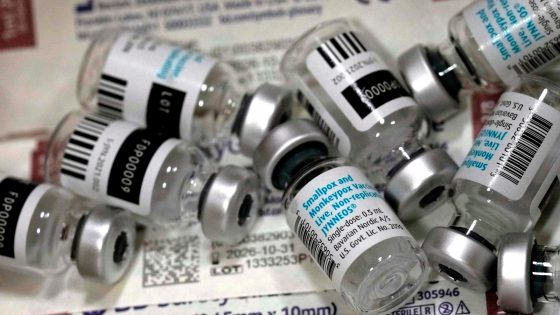In summer 2022, the global mpox outbreak seemed poised to overwhelm the U.S. with cases rising exponentially every week and no signs of slowing.
A successful public health campaign — promoting behavior changes and vaccination — helped cases drop dramatically.
However, a new small study published Thursday and led by the University of California, Los Angeles (UCLA) says that mpox cases are still circulating at low levels in the U.S. and primarily among unvaccinated high-risk groups.
Dr. David Talaen, co-lead author and a professor of emergency medicine and infectious diseases at UCLA, said after the 2022 global outbreak, there were small, localized outbreaks seen in cities including Chicago and Los Angeles, so the team wanted to examine if mpox was remerging.
“The second thing was that mpox is not strictly a sexually transmitted infection,” he told ABC News. “It can be transmitted between people just with any skin-to-skin contact, and the rash can be on any part of the body. So, we were curious if cases might have been overlooked and in groups other than the risk group that was identified in 2022, which was gay and bisexual men who have sex with men.”
A finger infected with monkeypox.
AP, FILE
For the study, the team looked at data from 13 U.S. emergency departments between June 2023 and December 2023, specifically among patients who visited EDs with a rash that resembled the rash mpox patients have.
Of the 196 patients with a rash, mpox was diagnosed in just 1.5% of them. Each of the patients with mpox identified as gay or bisexual men who have sex with men and had not been vaccinated against mpox.
The mpox patients had also engaged in sex with one or more partners they met through smartphone dating apps, the study found.
No mpox cases were identified in other groups, including women, children or unhoused individuals.
Anyone can get or spread mpox regardless of their gender or sexual orientation, but the U.S. outbreak began spreading primarily among gay or bisexual men and has continued to do so at low levels.
Many public health experts credit this community with rapidly responding to the outbreak through awareness campaigns and high vaccine uptake, which likely helped prevent further spread.
The authors wrote that the findings “underscore the importance of educating persons at risk for mpox regarding behavioral risks and encouraging these persons to be vaccinated.”
Currently, the JYNNEOS vaccine, a two-dose vaccine approved by the Food and Drug Administration to prevent smallpox and mpox, is the only vaccine being used in the U.S.
Data from Africa has shown two doses of JYNNEOS are at least 85% effective in preventing mpox infection.
To increase the number of JYNNEOS doses available earlier in the outbreak, the FDA authorized a proven strategy in August 2022 to inject the vaccine intradermally, just below the first layer of skin, rather than subcutaneously, or under all the layers of skin.
This allows one vial of vaccine to be given out as five separate doses rather than a single dose.

Smallpox and Monkeypox vaccines at a Galveston County Health District mobile clinic, Sept. 3, 2022, in Galveston.
Marie D. De Jesus/Houston Chronicle via Getty Images
Talaen said the public health campaign was successful due to the dramatic decline in cases related to the 2022 outbreak, but that it doesn’t mean the disease disappeared.
“There was an idea that after the 2022 outbreak and the decline of cases the disease is gone; it’s not gone,” he said. “Cases still continue. So, it’s important for people to protect themselves, both through their behaviors and if, at-risk, through vaccination.”
Source Agencies


